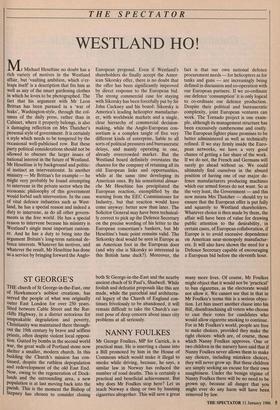NANNY FOULKES
Mr George Foulkes, MP for Carrick, is a practical man. He is inserting a clause into a Bill promoted by him in the House of Commons which would make it illegal to smoke while driving, because, he says, a similar law in Norway has reduced the number of road deaths. This is certainly a practical and beneficial achievement. But why does Mr Foulkes stop here? Let us teach Norway a thing or two by banning cigarettes altogether. This will save a great fact is that our own national defence procurement needs — for helicopters as for tanks and guns — are increasingly being defined in discussion and co-operation with our European partners. If we co-ordinate our defence 'consumption' it is only logical to co-ordinate our defence production. Despite their political and bureaucratic' complexity, joint European ventures can work. The Tornado project is one exam- ple, although its management structure has been excessively cumbersome and costly. The European fighter plane promises to be better administered as well as technically refined. If we stay firmly inside the Euro- pean networks, we have a very good chance of getting a fair share of the work. If we do not, the French and Germans will surely go ahead without us. We could ultimately find ourselves in the absurd position of having one of our major de- fence manufacturers producing machines which our armed forces do not want. So at the very least, the Government — and this now means Mrs Thatcher — should try to ensure that the European offer is put fully and squarely to Westland shareholders. Whatever choice is then made by them, the affair will have been of value for drawing public attention to the desirability, in certain cases, of European collaboration, if Europe is to avoid excessive dependence on American near-monopoly manufactur- ers. It will also have shown the need for a Defence Secretary capable of encouraging a European bid before the eleventh hour.
many more lives. Of course, Mr Foulkes might object that it would not be 'practical' to ban cigarettes, as the electorate would not allow it. We cannot see that in that in Mr Foulkes's terms this is a serious objec- tion. Let him insert another clause into his Bill, disenfranchising all voters who choose to cast their votes for candidates who would allow cigarette smoking to continue. For in Mr Foulkes's world, people are free to make choices, provided they make the right choices: which are, of course, those which Nanny Foulkes approves. One or two children in the nursery have said that if Nanny Foulkes never allows them to make any choices, including mistaken choices, they will never grow up. But these children are simply seeking an excuse for their own naughtiness. Under the benign regime of Nanny Foulkes there will be no need to be grown up, because all danger that you might ever do any harm will have been removed by law.


























































 Previous page
Previous page